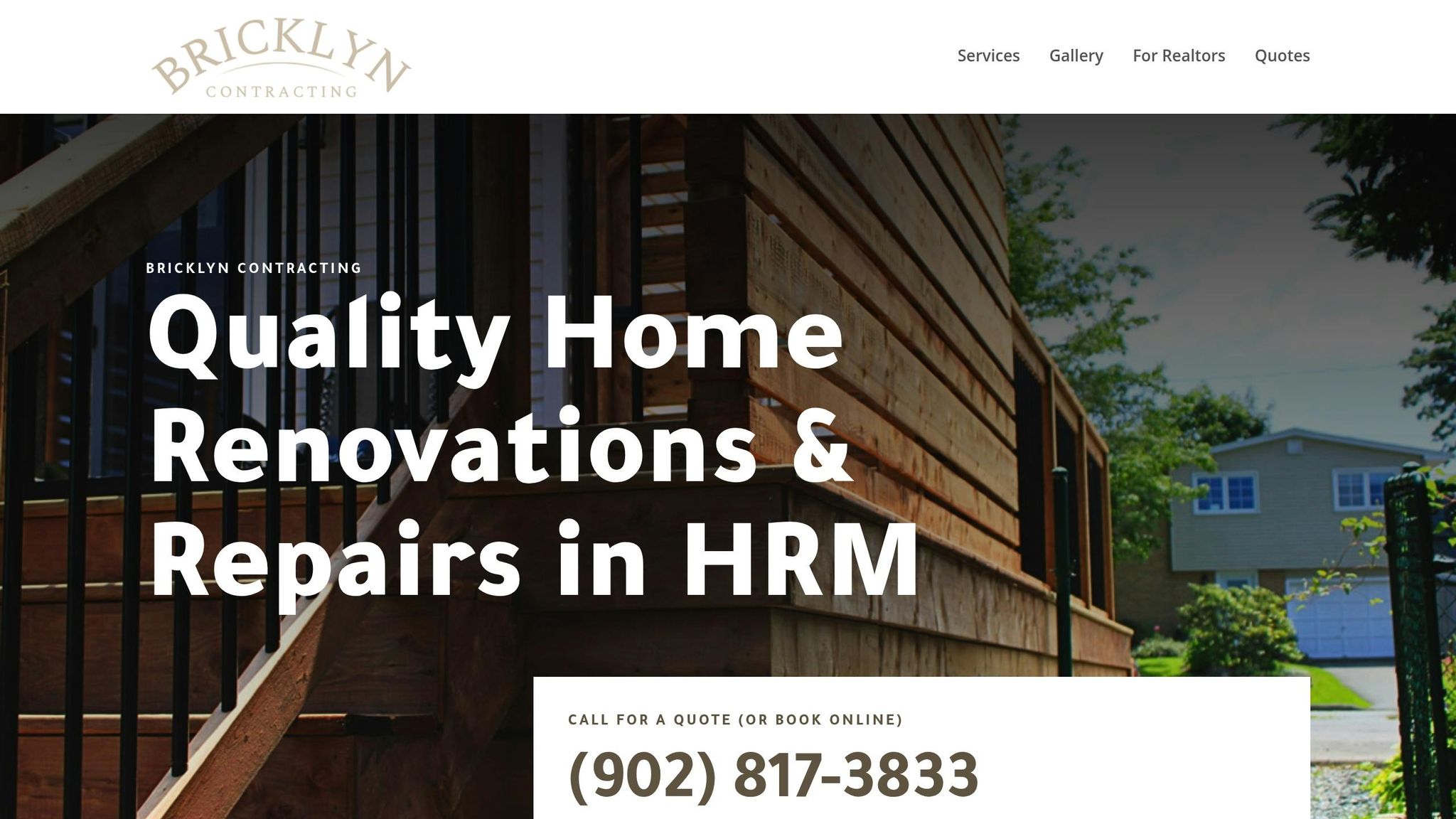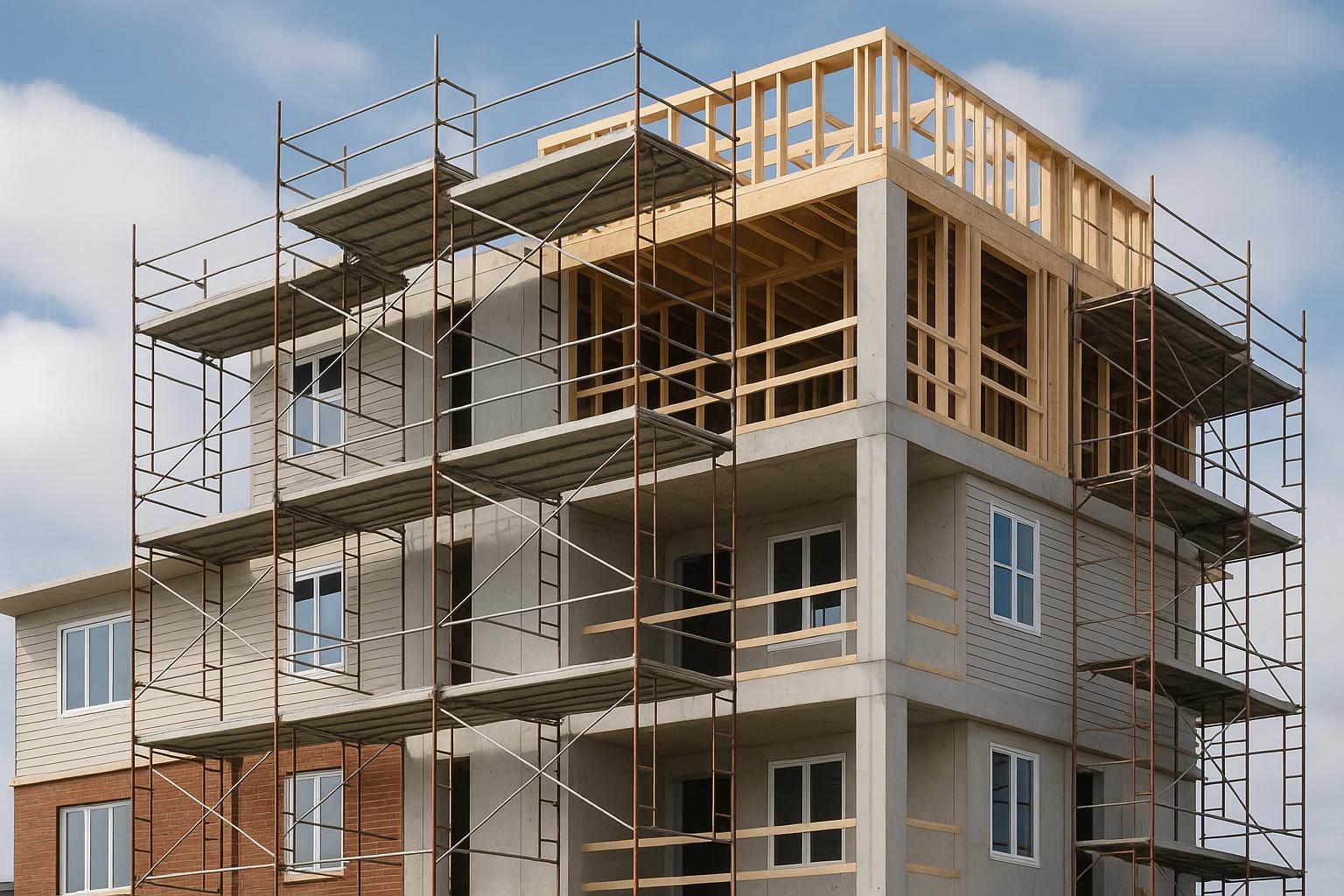Choosing the right contract and builder for your Halifax apartment project can save you time, money, and stress. Fixed-price and cost-plus contracts each have distinct benefits and risks, and your decision will directly impact your project's budget, timeline, and overall success.
- Fixed-Price Contracts: Offer cost certainty by locking in a total price upfront. Builders assume financial risks, making this option ideal for predictable budgets and financing. However, changes during construction can be expensive.
- Cost-Plus Contracts: Provide transparency by billing for actual expenses as they occur. While this allows flexibility, it shifts financial risks to you and requires active cost monitoring.
For Halifax’s urban infill projects, selecting a builder with local expertise and a proven track record is critical. Look for builders offering clear pricing, firm timelines, and an integrated design-build approach to streamline the process. Delays can cost you up to $8,800/month in lost rental income, so prioritize efficiency and accountability.
Quick Comparison:
| Factor | Fixed-Price Contract | Cost-Plus Contract |
|---|---|---|
| Cost Certainty | Locked-in total cost | Varies with actual expenses |
| Risk | Builder assumes most risks | Owner assumes construction risks |
| Payment | Milestone-based | Based on actual expenses |
| Flexibility | Limited for changes | High, but can lead to cost overruns |
Understanding these differences and choosing the right builder can ensure your project stays on track and meets your financial goals. Halifax’s rental market offers $1,950–$2,100 per unit monthly - don’t let poor planning or delays eat into your returns.
Building Halifax: Bricklyn Contracting’s Story | Halifax Network Podcast | Chris Crowell

1. Fixed-Price Contracts
Fixed-price contracts are a straightforward way to manage construction costs, particularly for small apartment projects in Halifax. They lock in your total expenses upfront, offering a clear solution to the budget uncertainties often associated with construction. Once the price is set, it remains unchanged - even if material costs rise, labour shortages occur, or unexpected site challenges emerge during the build.
Price Certainty
One of the biggest benefits of fixed-price contracts is the financial clarity they provide. From the moment you sign the agreement, you know exactly what your project will cost. For example, a 4-unit build might cost $640,000 for standard construction or $800,000 if it qualifies under CMHC MLI Select. This predictability allows you to secure financing with confidence and calculate your expected returns - typically in the 12–20% annual range - without worrying about surprise expenses eating into your profits.
With this type of contract, the builder takes on the risk of covering any extra costs that arise during construction. This is a huge advantage in Halifax, where fluctuating material prices and labour shortages can make budgeting unpredictable. By transferring these risks to the builder, you can avoid unexpected cost spikes and maintain stable rental projections without needing to hike rates to cover unforeseen expenses.
Risk Allocation
A key feature of fixed-price contracts is the way they shift construction risks from the property owner to the builder. This includes risks related to rising material prices, changes in labour costs, weather delays, and unforeseen site conditions. Essentially, the builder agrees to manage these uncertainties within the agreed price.
This arrangement is especially useful for apartment projects in Halifax, where the region's unpredictable weather and the complexities of urban infill construction can introduce many variables. Builders account for these risks in their pricing by including a contingency buffer. While this means you’ll pay a bit more upfront, it spares you the stress and potential financial strain of managing these risks yourself.
Payment Structure
Fixed-price contracts also come with a structured payment schedule tied to construction milestones rather than actual costs. Typically, you’ll make an initial deposit, followed by progress payments at key stages, and a final payment upon project completion.
This milestone-based system gives property owners leverage. Payments are only released when specific phases of work are completed to your satisfaction, ensuring builders stay on schedule and maintain quality. Unlike cost-plus contracts, where you pay for time and materials regardless of efficiency, fixed-price agreements motivate builders to work efficiently and deliver on time.
For financing, this structure is a big plus. Lenders like banks and credit unions often prefer fixed-price contracts because they provide clear payment schedules aligned with construction progress. This makes it easier to secure and manage construction loans.
Change Order Handling
Changes to the original scope of work - known as change orders - can complicate fixed-price contracts. Builders typically charge premium rates for these adjustments since they disrupt project workflows and timelines.
To handle change orders effectively, it’s important to establish a clear process in the initial contract. This should outline how changes are requested, priced, and approved, as well as how they might affect the project’s timeline. Be prepared for change orders to cost more than the base rate, as they involve unplanned work.
The best way to avoid costly change orders is to focus on detailed planning and design before construction begins. Using an integrated design-build approach, where architects, engineers, and construction teams collaborate from the start, can help identify potential issues early on and reduce the need for mid-project changes. This proactive approach saves both time and money in the long run.
2. Cost-Plus Contracts
Cost-plus contracts take a different approach compared to fixed-price agreements. Instead of locking in a total project cost upfront, you pay for actual construction expenses as they occur, along with the builder's fee. This method offers more flexibility but requires you to stay actively involved in monitoring costs and overseeing the project. Below, we’ll break down how cost-plus contracts address pricing, risk, payments, and changes.
Price Certainty
Cost-plus contracts don’t offer the same price predictability as fixed-price contracts. While you’ll receive detailed estimates during the planning stage, the final costs depend on real-time expenses and any unexpected issues during construction.
For example, if you’re working on a small multi-unit apartment project in Halifax, early estimates can shift significantly due to fluctuating market conditions. Be prepared for the possibility of cost overruns.
Risk Allocation
With cost-plus contracts, the property owner takes on most of the construction risks. Unlike fixed-price agreements, where the builder shoulders these risks, you’ll be responsible for things like rising material costs, labour shortages, weather delays, or unforeseen site challenges.
That said, this setup can sometimes work in your favour. For instance, if material prices drop or the project progresses faster than anticipated, you could see savings. However, in a market like Halifax, where material costs and trade availability can vary with the seasons, the risk of cost increases is real.
The builder’s role focuses on delivering quality work and managing the project efficiently. They aren’t financially liable for external factors such as supply chain issues or unexpected site conditions, like needing extra foundation work due to unstable soil. This reduced financial risk for builders often translates to lower management fees compared to the higher premiums typically built into fixed-price contracts.
Payment Structure
Payments under cost-plus contracts are based on actual expenses rather than a pre-set schedule tied to milestones. Builders usually provide detailed invoices for all costs, often on a weekly basis.
This payment approach gives you transparency but requires regular expense reviews and careful cash flow management. While some property owners find this level of involvement demanding, others appreciate the clarity it provides.
However, the frequent payment demands can strain cash flow, particularly during busy construction phases when multiple trades are working simultaneously. Unlike fixed-price contracts, where payments align with completed phases, cost-plus agreements require funds to be available as expenses arise, regardless of progress milestones.
Change Order Handling
One of the key advantages of cost-plus contracts is their flexibility in handling changes. Adjustments, upgrades, or modifications can be smoothly incorporated into the ongoing expense tracking without separate negotiations. This is especially helpful in apartment construction when opportunities to enhance rental appeal or adjust to site conditions emerge.
That said, this flexibility requires disciplined scope management. It’s easy to approve small upgrades along the way, but these incremental changes can add up and push your project over budget. To maintain control, it’s crucial to set clear approval processes and budget limits. This way, you can take advantage of the contract’s flexibility without jeopardizing your financial plan.
sbb-itb-16b8a48
Contract Comparison: Advantages and Disadvantages
When planning your Halifax apartment project, choosing between fixed-price and cost-plus contracts is a crucial decision. Each contract type comes with its own set of benefits and challenges, directly affecting risk, cost, and your level of involvement in the project.
Fixed-price contracts offer a clear advantage in terms of budget certainty. With this approach, you lock in a total cost at the outset, shifting the financial risks to the builder. However, this certainty often comes at a higher upfront cost. Additionally, any changes to the project scope can lead to expensive renegotiations, and there’s limited insight into the actual breakdown of costs.
Cost-plus contracts, on the other hand, focus on transparency and adaptability. They provide detailed visibility into every expense and even allow savings if conditions improve. But this flexibility means the financial risks fall on you, the property owner. Managing cash flow can also become more complex, as payments fluctuate based on the progress and expenses of the project.
| Factor | Fixed-Price Contract | Cost-Plus Contract |
|---|---|---|
| Price Certainty | Locked-in total cost | Cost varies with actual expenses |
| Risk Allocation | Builder assumes most risks | Owner bears construction risks |
| Payment Structure | Milestone-based payments | Payments tied to incurred expenses |
| Change Orders | Can lead to costly renegotiations | Easier to integrate into project costs |
| Cash Flow | Predictable payment schedule | Variable, based on project activity |
| Cost Transparency | Limited visibility | Full visibility into expenses |
Your choice will significantly impact funding strategies and project oversight. If you value predictable costs and minimal day-to-day involvement, a fixed-price contract may be the better fit, even if it comes with a higher initial price tag. On the flip side, a cost-plus contract is ideal for those who are comfortable managing finances closely and navigating variable cash flows, as it provides greater transparency and flexibility.
Financing considerations are also key. Fixed-price contracts often align better with traditional construction loans due to their predictable payment schedules. Cost-plus contracts, however, may require more adaptable financing arrangements to accommodate fluctuating payment timelines.
How to Choose the Right Apartment Builder for Urban Infill Projects
When planning an apartment project in Halifax, selecting the right builder is one of the most important decisions you'll make. A good builder can mean the difference between a smooth, successful project and a drawn-out, costly ordeal. To make the best choice, focus on four key factors: pricing, timelines, local experience, and integration. Beyond these, elements like communication and technology can also play a big role in ensuring reliable project delivery.
Pricing Transparency
Start by looking for builders who are upfront about costs. Many traditional contractors use fragmented construction models, which can hide fees across multiple contracts with architects, engineers, and general contractors. This lack of clarity often leads to unexpected expenses and inefficiencies - sometimes adding up to $47,000 or more in wasted coordination costs. Instead, choose builders who offer fixed-price quotes that cover everything from design to construction. This level of transparency not only eliminates hidden fees but also sets the stage for evaluating the builder's other qualities.
Timeline Accountability
A builder's ability to stick to deadlines is another critical factor. Avoid those who rely on vague timelines or "hope for the best" scheduling. Instead, seek builders who commit to firm completion dates, ideally backed by penalty clauses (e.g., $1,000 per day for delays). Some builders may even offer accelerated timelines, completing projects in as little as six months compared to the typical 12–18 months. This kind of accountability can save both time and money.
Local Experience
Halifax's urban infill projects come with unique challenges, so it's essential to work with a builder who has a proven track record in the area. Check whether they have an active local pipeline, meaning ongoing projects within a 90-minute radius of Halifax. This demonstrates established relationships with local trades, suppliers, and municipalities - key factors that can streamline your project and reduce delays.
Integrated Design-Build Approach
Traditional construction methods often involve juggling multiple contractors, leading to miscommunication and delays. An integrated design-build approach, on the other hand, simplifies the process by providing a single point of accountability. Builders who use this method often combine it with rigorous quality checks and extended warranties, ensuring high standards throughout the project.
Communication and Technology
Clear communication during construction is a hallmark of a professional builder. Look for builders who provide daily photo updates and real-time access to project details through online portals. This transparency allows you to monitor progress easily, no matter where you are. Builders who rely on ad-hoc updates or only communicate when issues arise are best avoided.
Technology also plays a key role in project management. Builders who use advanced, data-driven scheduling tools can offer more predictable timelines, outperforming traditional contractors who often lack this level of precision.
Financial Alignment and Specialization
Your builder's financial structure should align with your project's success. Builders who profit from change orders or cost overruns often have conflicting incentives. Instead, opt for those who use fixed-price contracts with penalties for delays, as this encourages efficiency and ensures your goals are prioritized.
Finally, specialization matters. Urban infill projects, particularly those involving 4–24 unit rental properties, require a builder who understands the rental market. Builders focused on luxury homes or large commercial projects may lack the expertise needed to address tenant preferences, rental market demands, and property management considerations - all of which affect long-term returns.
Conclusion
Choosing between fixed-price and cost-plus contracts comes down to how much certainty you need over costs, how predictable your timeline needs to be, and how much risk you’re willing to take on. Fixed-price contracts lock in your expenses, protecting you from unexpected overruns. On the other hand, cost-plus contracts shift risks like rising material costs or labour delays onto you, making your expenses harder to predict.
Taking an integrated design-build approach can simplify things compared to traditional, fragmented methods. By handling planning, architecture, engineering, and construction under one roof, this model cuts down on inefficiencies. This is especially useful in Halifax's competitive market, where construction delays can cost you around $8,800 per month in lost rental income.
Builders who commit to six-month timelines with penalties for delays often deliver more efficiently than those using fragmented methods, which can stretch projects to 12–18 months.
When it comes to urban infill projects, it’s crucial to work with builders who know the Halifax market inside out. Look for those with active local pipelines within 90 minutes of the city. This ensures they have strong relationships with trades and suppliers and understand municipal regulations. With rental units in Halifax generating between $1,950 and $2,100 per month, choosing a builder who understands what tenants want can make a big difference.
Your contract choice should also align with your financing plans. Projects that meet CMHC MLI Select standards often qualify for better terms, and fixed-price builds can support solid returns of 12–20%.
Equally important is how your builder’s incentives align with your goals. Avoid builders who profit from change orders or cost overruns, as this creates conflicting interests and can lead to strained relationships. Instead, opt for builders who focus on efficient delivery, offer extended warranties, and provide daily updates to keep everything transparent.
In Halifax’s apartment construction market, focusing on systematic delivery rather than chasing the lowest bid will help you achieve the rental income and returns needed to succeed with urban infill projects. A well-thought-out approach to contracts and builder selection is your key to predictable returns and a smoother construction process.
FAQs
What are the benefits of choosing a fixed-price contract for small apartment projects in Halifax, and how does it affect financing?
Choosing a fixed-price contract for small apartment projects in Halifax comes with clear benefits. One of the biggest perks is budget certainty. With the total cost set in advance, property owners can avoid surprise expenses and keep financial risks in check - especially important for smaller projects where budgets are often tight.
These contracts also make financing more straightforward. Predictable costs are attractive to lenders and investors, making it easier to secure funding and manage cash flow effectively. Plus, fixed-price agreements reduce the chances of cost overruns and disputes, helping projects stay on budget - an essential factor in Halifax's competitive construction scene.
What steps can property owners take to reduce risks with cost-plus contracts in Halifax’s changing construction market?
To navigate the challenges of Halifax’s ever-changing construction market, property owners using cost-plus contracts should focus on creating clear and precise contract terms. Including a maximum cost cap and requiring detailed expense reports can provide much-needed cost control and help avoid unpleasant financial surprises.
Staying on top of expenses through regular reviews and keeping open lines of communication with the builder are equally important. This approach allows for early detection of potential cost overruns. Additionally, local factors like rising material prices and labour shortages should be considered when setting a realistic budget. Including contingency funds in the budget can offer a safety net, reducing financial uncertainty and keeping the project moving forward.
What should I look for in a builder to ensure a successful and cost-efficient urban infill apartment project in Halifax?
When planning an urban infill apartment project in Halifax, it's crucial to partner with a builder who has a strong history with small multi-unit developments. Builders experienced in these types of projects are better equipped to handle the specific challenges of urban construction, like meeting zoning regulations, managing tight timelines, and working within limited spaces.
Look for a builder who offers clear, detailed estimates and prioritizes open communication from start to finish. A well-organized project management approach - complete with defined timelines, regular updates, and efficient resource allocation - helps ensure your project stays on track and within budget.
Finally, choose someone known for their accountability and high-quality craftsmanship in Halifax. A builder with local knowledge and a focus on smaller residential projects can make the process smoother and more successful.



